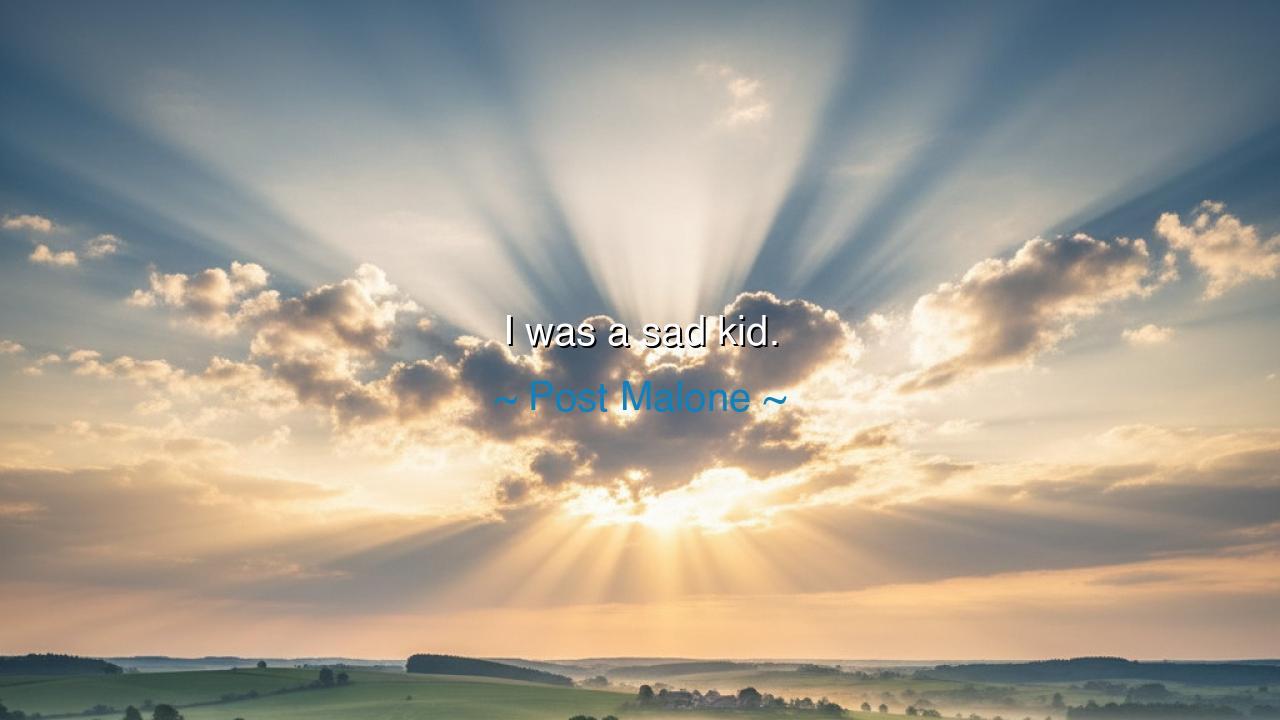
I was a sad kid.






There is quiet power and deep vulnerability in the words of Post Malone, who once said, “I was a sad kid.” In their simplicity, these few words carry the weight of every lonely heart that has ever struggled to understand itself. This confession, stripped of glamour and fame, is not merely a reflection of a childhood, but a universal echo — a truth that sadness often accompanies sensitivity, and that from sorrow can come the seed of creation. His words remind us that behind many who bring joy to others lies a story of quiet pain, endured and transformed into art.
The origin of this quote lies in Malone’s reflections on his early years — long before the stage lights and applause, before the tattoos and records, there was simply a boy who felt deeply. In interviews, he has spoken of isolation, of being misunderstood, of carrying emotions he could not always explain. Like many artists, his sadness did not end with childhood; rather, it became the wellspring from which his music flows. Through it, he learned what the ancients always taught: that pain, when not denied, can be transmuted into beauty, and that expression is both cure and calling.
To the ancients, sadness was not an ailment to be erased, but a teacher to be respected. The great philosopher Aristotle believed that melancholy was the companion of genius, writing that those who are “outstanding in philosophy, poetry, or the arts” often bear heavy hearts. He called it the divine sadness — not weakness, but the burden of seeing the world too clearly, of feeling too deeply. So it was with Malone, whose music — a blend of joy and ache, of melody and mourning — mirrors that ancient paradox: that beauty often arises from brokenness, and that the soul must first descend into shadow before it can rise into light.
Consider the story of Vincent van Gogh, the painter whose works now dazzle the world with color and emotion. In his lifetime, he was poor, rejected, and tormented by despair. Yet from his pain emerged the brilliance of Starry Night, a vision of infinite depth and motion. Like Malone’s song “Circles,” which speaks of love’s cycles and loss, van Gogh’s brush captured the rhythm of sadness as part of life’s eternal dance. Both men, separated by centuries, found the same truth: that through art, suffering can be transformed, and in that transformation, others can find healing.
When Post Malone says, “I was a sad kid,” he speaks for every soul who has carried unseen sorrow — the child who sits in silence, misunderstood; the dreamer who feels too much and cannot explain why. His words do not glorify sadness, but honor it. For sadness, when faced honestly, softens the heart. It teaches empathy. It gives depth to joy, meaning to love, and humility to success. Without sadness, the soul remains shallow — untouched by the profound currents that shape compassion.
But there is also a quiet victory in his confession. For though he was a “sad kid,” he did not remain trapped in that sadness. He turned it into song, into rhythm, into something shared. In doing so, he fulfilled one of the oldest truths of human experience — that expression redeems pain. The ancients would call this catharsis, the purging of emotion through art and storytelling. When Malone sings, he not only frees himself; he frees those who listen and recognize their own sorrow within his voice. This is the power of vulnerability — to transform isolation into communion.
The lesson, my children, is this: your pain is not your enemy; it is your teacher. Do not hide from sadness, for in facing it, you discover your strength. The tears you shed are not signs of weakness but of depth — they are the proof that you are alive, that your heart still feels. If you carry loneliness, let it become empathy; if you carry fear, let it become understanding. Create, speak, sing, or write — for through expression, you give your pain meaning, and through meaning, you give it peace.
For as Post Malone reminds us, the child who is “sad” can grow into the artist who heals others. The shadows of youth need not be prisons — they can become portals to purpose. So honor your feelings, even the dark ones. Transform them, as he did, into something luminous. For in the end, the world does not remember those who never felt pain — it remembers those who turned their pain into light.






AAdministratorAdministrator
Welcome, honored guests. Please leave a comment, we will respond soon